Pregnancy can bring a lot of attention to expecting parents from their inner and even outer circles. While these people are probably well-meaning, constantly being in the spotlight during such a personal time can get overwhelming. So, in order to maintain some peace and normalcy, parents may decide to establish some boundaries.
As did this couple. Well, at least they tried to, as the MIL with whom they tried to set the limits refused to listen to them. She even forced herself into their gender reveal, which she inevitably dampened with her unacceptable behavior. At a loss, the pregnant woman turned online for some advice on how to deal with the situation that had unfolded.
Scroll down to read the full story and a conversation with licensed clinical psychologist, certified executive coach, and consultant Dr. Anne Welsh; licensed psychotherapist Dr. Aerial Cetnar; and licensed therapist and perinatal mental health specialist Ashley Fields, who kindly agreed to share their insights about setting boundaries during pregnancy.
Personal space is very important during pregnancy

Image credits: Alexander Mass / pexels (not the actual photo)
This MIL completely ignored such a fact, butting her unwanted behavior into this family’s business






Image credits: pressfoto / freepik (not the actual photo)







Image credits: Usman bloch / freepik (not the actual photo)






Image credits: kues1 / freepik (not the actual photo)








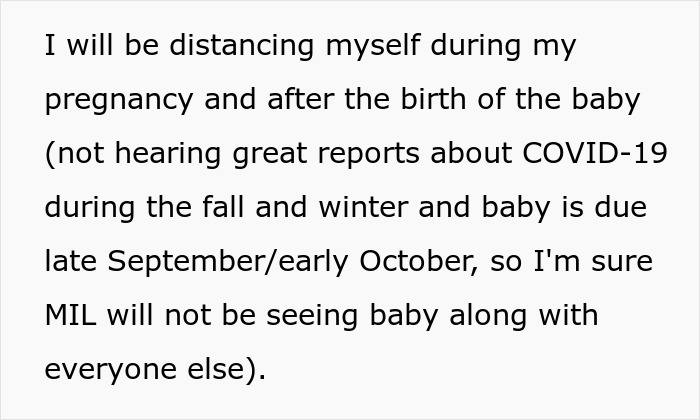

Image credits: photoroyalty / freepik (not the actual photo)




Image credits: Piper_Dear
Personal space and calmness are essential during pregnancy

Image credits: gpointstudio / freepik (not the actual photo)
All our interviewed mental health experts agree that personal space and calmness are essential during pregnancy.
“Pregnancy is a profound physical, emotional, and psychological transition, and maintaining a sense of autonomy over your body and your choices helps foster a healthy adjustment,” explains licensed clinical psychologist, certified executive coach, and consultant Dr. Anne Welsh.
“Yet something happens when a woman becomes visibly pregnant: her body often becomes treated as public property. People touch her belly without asking, comment on her size, and offer unsolicited advice. These are things they would never do outside of pregnancy. This can leave women feeling exposed, judged, and even invisible as a person apart from the pregnancy. Protecting personal space and peace is one way to affirm, ‘This is still my body, my experience, and my story to tell.’”
“Personal space and peace help expecting parents slow down, listen to their bodies, and tune into what they need, whether that’s rest, quiet, or just fewer opinions flying at them,” adds licensed psychotherapist Dr. Aerial Cetnar. “It’s a big life transition that requires a lot of mental preparation. Feeling grounded and safe matters, and that often starts with having room to breathe.”
If pregnant women’s personal space is invaded and boundaries are crossed, it may increase stress, which can have negative effects on the mom and baby.
“Studies have shown that increased stress can increase levels of cortisol for pregnant folks and fetuses. There is a correlation with a higher chance of preterm birth, lowered birth weights, increased risk of perinatal mood and anxiety disorders and other complications,” licensed therapist and perinatal mental health specialist Ashley Fields.
“When boundaries are repeatedly crossed, whether physically or emotionally, it can chip away at a woman’s sense of agency and increase stress,” additionally notes Dr. Welsh. “Research, including my own, has shown that this kind of unwanted attention can negatively affect body image during and after pregnancy. It can also contribute to feelings of anxiety, self-consciousness, or even resentment.”
When pregnant women’s boundaries are respected, they tend to feel more confident and supported

Image credits: freepik (not the actual photo)
On the other hand, when others respect pregnant women’s boundaries, they tend to feel more confident and supported, which is beneficial for their mental health and adjustment to motherhood, says Dr. Welsh.
“Setting the stage with good boundaries, self-care, and strategies for promoting mental health during pregnancy can act as protective factors for maternal mental health. This is important because the number 1 complication of pregnancy, often untreated, is perinatal mood and anxiety disorders (PMADs),” notes Fields.
Dr. Welsh suggests that setting boundaries could mean simply offering kind but firm statements, like ‘We appreciate your concern, but we’re figuring out what works for us’ or ‘I’d rather not talk about my body or our plans right now.’
“It can also help to proactively share what you do welcome,” she adds. “For example, “We’re happy to talk about names once we’ve decided” or “Please check before posting photos of me.” Framing your needs positively and as part of taking good care of yourself and the baby, can help family hear it as loving rather than rejecting.”
If the set boundaries aren’t respected, Dr. Cetnar advises repeating them as needed without over-explaining. “Some people may not like it, but your comfort and mental health matter more than keeping everyone happy. If someone keeps pushing, consider limiting your time with them overall or asking someone else to help reinforce boundaries. If they persist, it may be helpful to share how the lack of respect is making you feel and request more space.”
Lastly, Dr. Welsh says that it’s important to keep in mind that motherhood, beginning with pregnancy, is deeply personal and unique and what may work for one may not work for another.
“A woman’s choices about her body, her family, and her work are hers alone. My advice to others: assume she’s doing her best at two really hard things: growing a baby and growing into motherhood. Let her take the lead on what kind of attention and support she wants.”
Commenters were appalled by MIL ruining such a special time for the parents




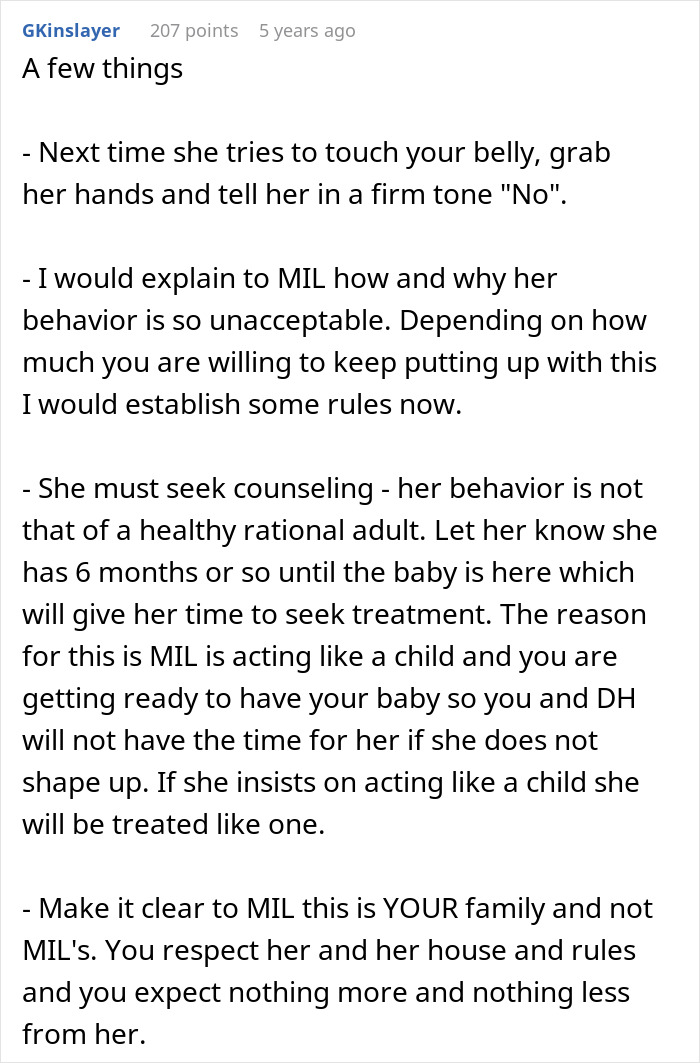




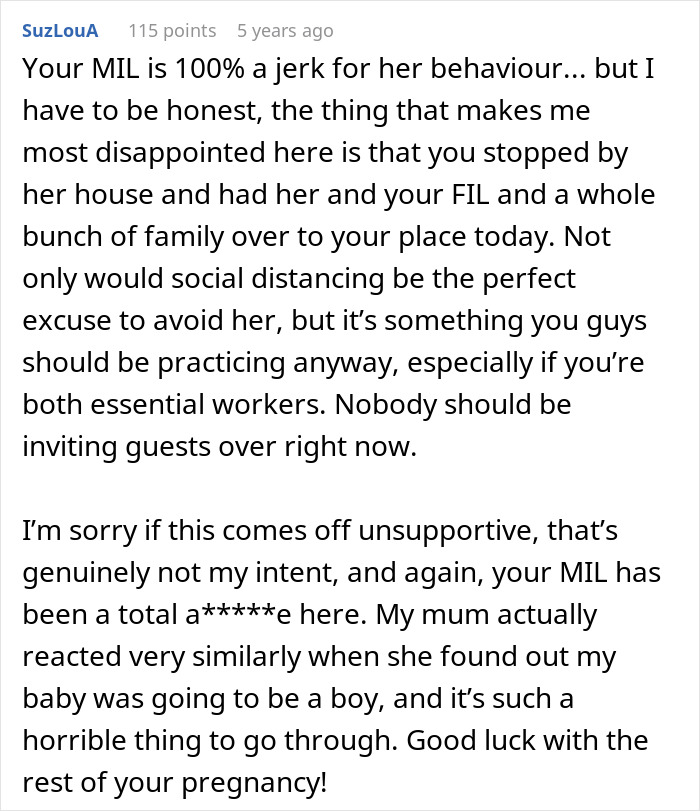
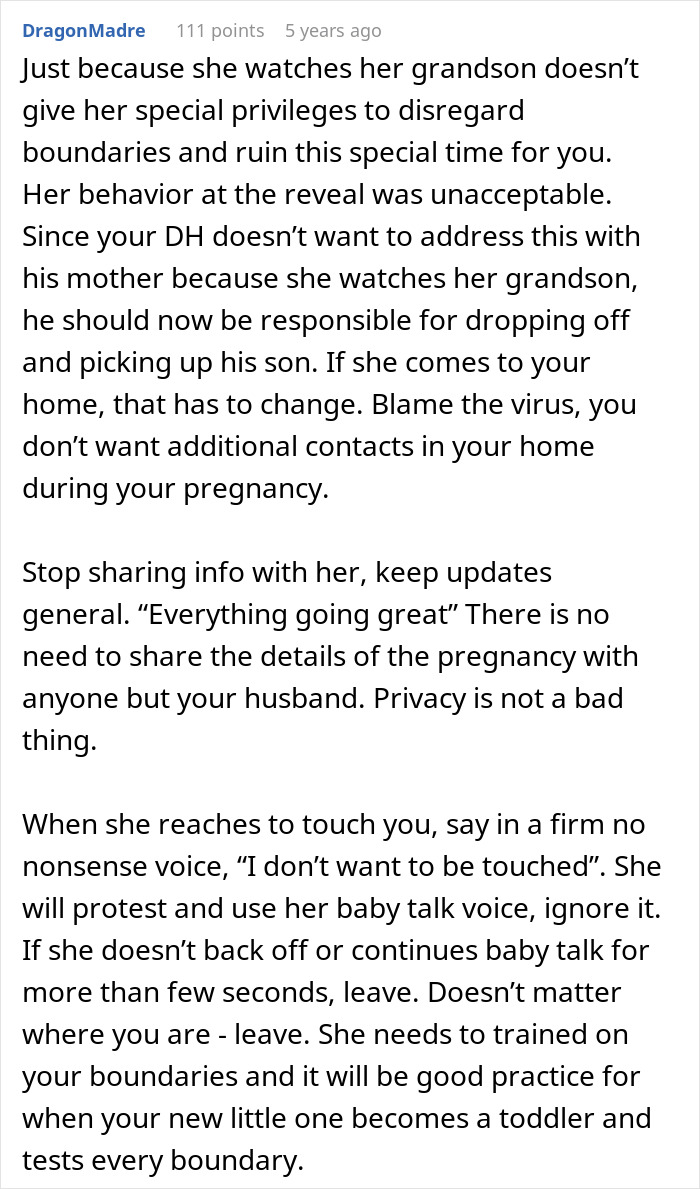
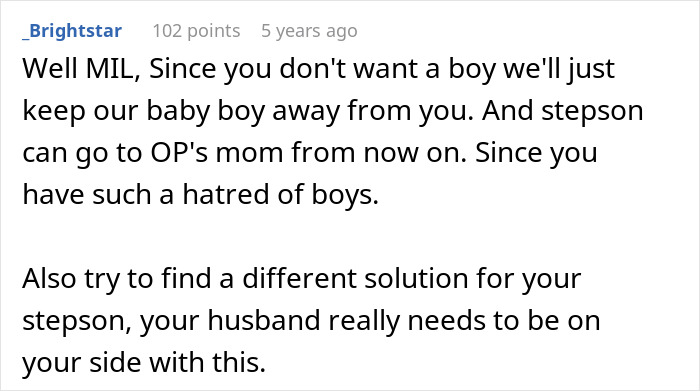




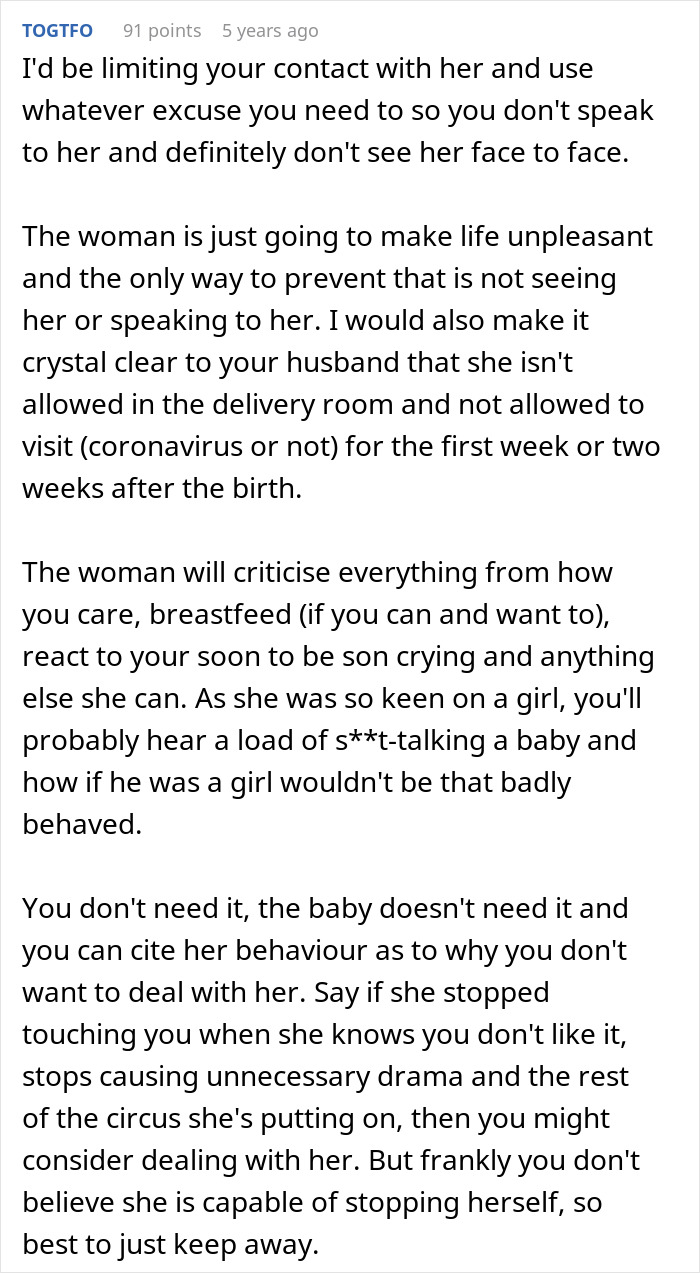




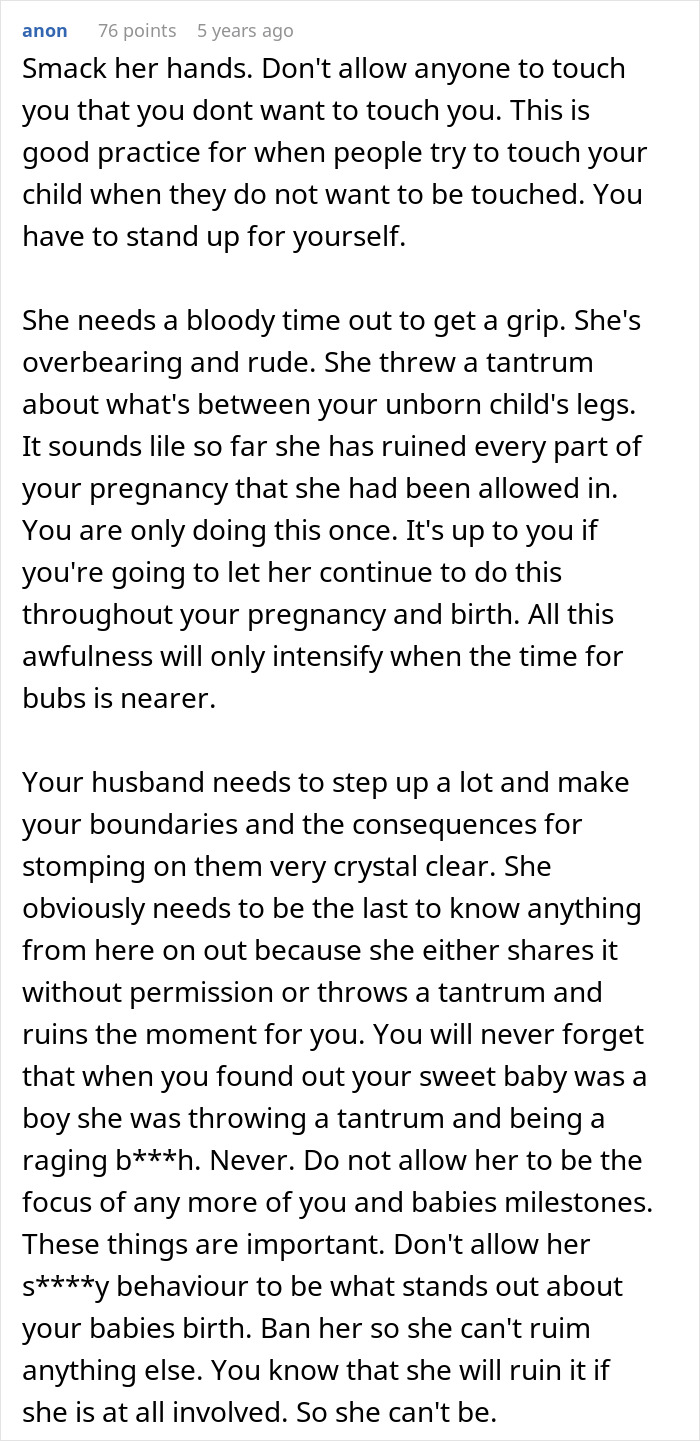






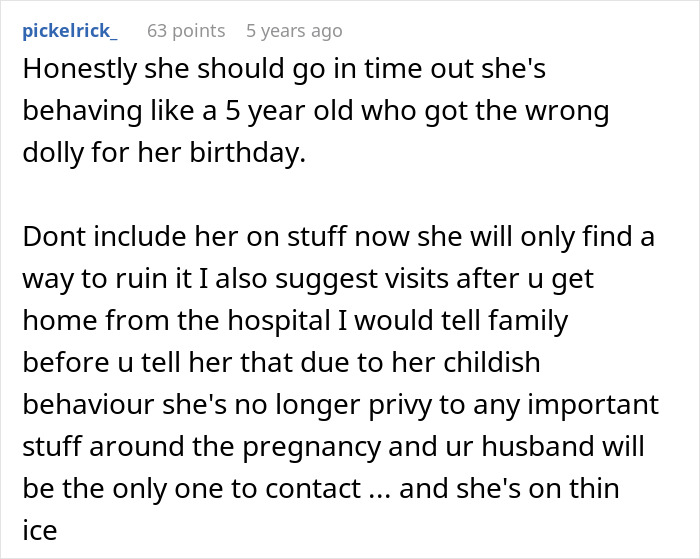


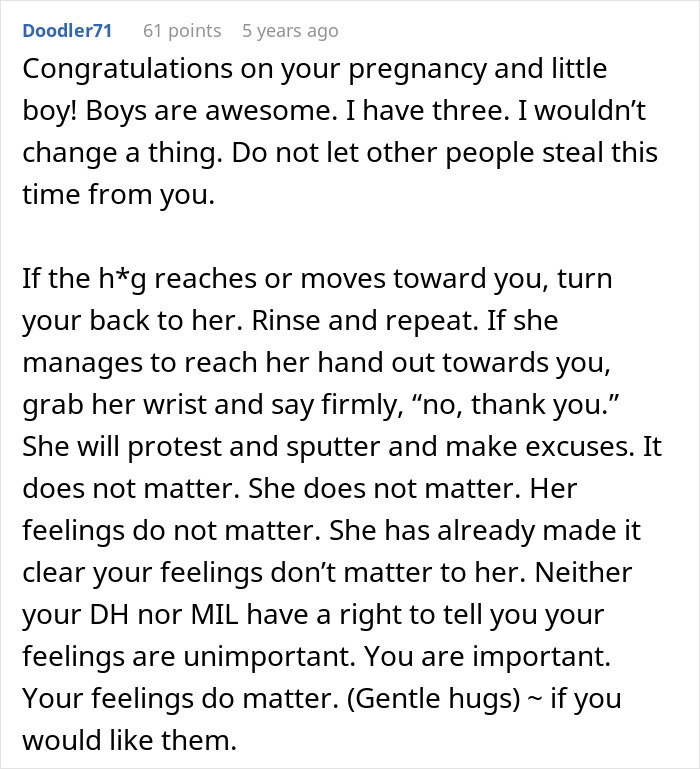

Others also shared similar stories


from Bored Panda https://ift.tt/uD1tWob
via IFTTT source site : boredpanda